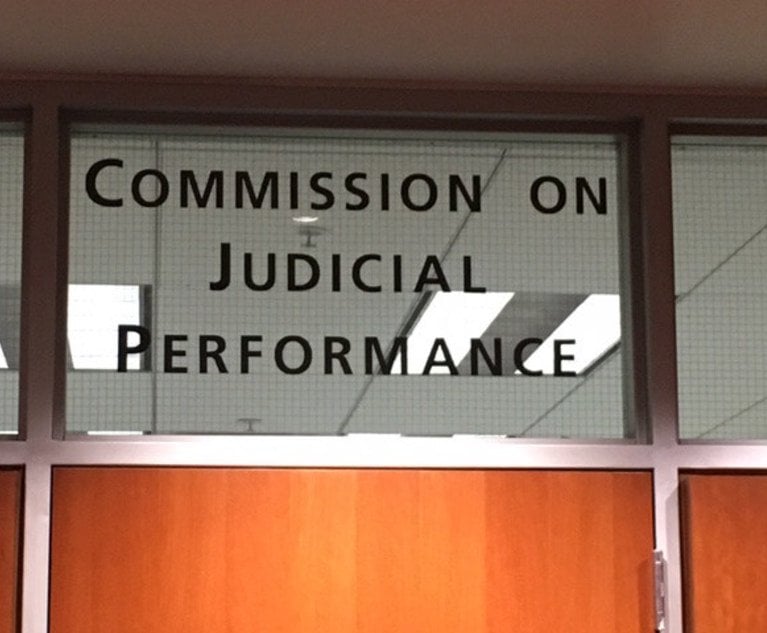Judicial Council Paid $500K-Plus to Settle Sexual Harassment Claims
According to information released to The Recorder Friday, since 2011 the Judicial Council of California has paid $296,000 to resolve three sexual harassment complaints against judges and $225,000 to resolve two complaints against employees.
March 23, 2018 at 06:05 PM
4 minute read

Updated 4:37 p.m.
California's Judicial Council paid more than $500,000 to settle sexual harassment claims against judges and court employees since 2011, according to information released to The Recorder on Friday.
The judicial branch's administrative arm also spent $79,750 on attorneys and investigators to review harassment allegations against five judicial officers in the last eight years, lawyers for the judicial branch said.
The council declined to say which judges were accused of wrongdoing and whether they are still on the bench.
The limited information was released in response to public record requests The Recorder submitted on Dec. 5 and 6, 2017, shortly after the state Legislature was engulfed in a wave of sexual harassment complaints. Three lawmakers have resigned, and a member of the Assembly under investigation is on leave.
After heavy public scrutiny, legislative leaders in February released details, including the names of the accused, of 18 substantiated complaints against lawmakers and high-ranking legislative aides. Lawyers for the judiciary, which operates under its own public records rule of court, contend that the branch does not have to provide any documents tied to the complaints or the settlements.
“Although the records themselves are exempt from disclosure … the Judicial Council recognizes the public interest in the expenditure of public funds,” according to an unsigned email from the council's legal services division.
The five-paragraph response said that the Judicial Council paid $296,000 to resolve three complaints alleging sexual harassment by judges. Branch lawyers did not immediately respond to requests to clarify whether that included multiple complaints against one judge.
Cathal Conneely, a spokesperson for judicial branch administrative director Martin Hoshino said in a statement Friday: “Any form of harassment is unwelcome in any workplace, and while there have been a limited number of reported incidents, it's still too many. California has robust judicial ethics programs with a Code of Ethics, ongoing training, access to guidance, and an independent state agency responsible for investigating complaints of judicial misconduct. We continue to strive to be responsive to the workplace needs of public servants at every level of the court system.”
The records also reveal that $225,000 was paid to resolve two complaints alleging sexual harassment by court employees since 2011.
The Recorder's requests for documents raised “complicated legal and ethical issues, including attorney-client privilege and other legal and ethical obligations,” the council's legal services division said.
“The Judicial Council is in the process of contacting the courts and individuals it represents to determine if they will waive their privileges to allow the Judicial Council to provide you the records,” according to the council.
Hoshino said in a meeting with reporters in December that some of the state's bigger trial courts, with large budgets and many attorneys on staff, may have settled sexual harassment complaints in the past without the Judicial Council's knowledge.
A number of state judges have been publicly accused of harassing or discriminatory conduct in recent years, although it's unknown if any of the settlements were triggered by their alleged behavior.
The San Jose Mercury News reported in December that Conrad Rushing, then the presiding justice of the Sixth District Court of Appeal in San Jose, resigned while facing allegations of sexual harassment and discrimination against employees.
Tulare County Superior Court Judge Valeriano Saucedo was removed from the bench in 2015 after he was accused of having an inappropriate relationship with a court clerk. Two trial court judges—one in Orange County and another in Kern County—were censured in 2014, each for having sex in their respective chambers, one with a clerk and another with two former law school students.
In late 2016, Lassen County Superior Court agreed to pay $100,001 to settle an executive clerk's claims in federal court that Judge Tony Mallery discriminated against her and other female employees in the court.
This report was updated at 4:37 p.m. with comment about the records disclosure.
Read more:
Misconduct Claims Against Appellate Judge Raise Novel Workplace Questions
California Weighs Banning Workplace Secret Settlements
Federal Judiciary Unveils First Reforms From Harassment Working Group
Judiciary Closes Kozinski Misconduct Probe, Saying It Can't 'Do Anything More'
Gibson Dunn Is Hired for Harassment Probe at California Statehouse
This content has been archived. It is available through our partners, LexisNexis® and Bloomberg Law.
To view this content, please continue to their sites.
Not a Lexis Subscriber?
Subscribe Now
Not a Bloomberg Law Subscriber?
Subscribe Now
NOT FOR REPRINT
© 2025 ALM Global, LLC, All Rights Reserved. Request academic re-use from www.copyright.com. All other uses, submit a request to [email protected]. For more information visit Asset & Logo Licensing.
You Might Like
View All
Advisory Opinion Offers 'Road Map' for Judges Defending Against Campaign Attacks
3 minute read
Sonoma County Judge Disciplined for Diving Too Far Into Local School Debate
5 minute read
'Clear Abuse of Discretion': 9th Circuit Says Judge Should Have Recused From Death Row Inmate's Lawsuit

Judges Say Social Media and Political Polarization Puts Them in Danger
Trending Stories
Who Got The Work
J. Brugh Lower of Gibbons has entered an appearance for industrial equipment supplier Devco Corporation in a pending trademark infringement lawsuit. The suit, accusing the defendant of selling knock-off Graco products, was filed Dec. 18 in New Jersey District Court by Rivkin Radler on behalf of Graco Inc. and Graco Minnesota. The case, assigned to U.S. District Judge Zahid N. Quraishi, is 3:24-cv-11294, Graco Inc. et al v. Devco Corporation.
Who Got The Work
Rebecca Maller-Stein and Kent A. Yalowitz of Arnold & Porter Kaye Scholer have entered their appearances for Hanaco Venture Capital and its executives, Lior Prosor and David Frankel, in a pending securities lawsuit. The action, filed on Dec. 24 in New York Southern District Court by Zell, Aron & Co. on behalf of Goldeneye Advisors, accuses the defendants of negligently and fraudulently managing the plaintiff's $1 million investment. The case, assigned to U.S. District Judge Vernon S. Broderick, is 1:24-cv-09918, Goldeneye Advisors, LLC v. Hanaco Venture Capital, Ltd. et al.
Who Got The Work
Attorneys from A&O Shearman has stepped in as defense counsel for Toronto-Dominion Bank and other defendants in a pending securities class action. The suit, filed Dec. 11 in New York Southern District Court by Bleichmar Fonti & Auld, accuses the defendants of concealing the bank's 'pervasive' deficiencies in regards to its compliance with the Bank Secrecy Act and the quality of its anti-money laundering controls. The case, assigned to U.S. District Judge Arun Subramanian, is 1:24-cv-09445, Gonzalez v. The Toronto-Dominion Bank et al.
Who Got The Work
Crown Castle International, a Pennsylvania company providing shared communications infrastructure, has turned to Luke D. Wolf of Gordon Rees Scully Mansukhani to fend off a pending breach-of-contract lawsuit. The court action, filed Nov. 25 in Michigan Eastern District Court by Hooper Hathaway PC on behalf of The Town Residences LLC, accuses Crown Castle of failing to transfer approximately $30,000 in utility payments from T-Mobile in breach of a roof-top lease and assignment agreement. The case, assigned to U.S. District Judge Susan K. Declercq, is 2:24-cv-13131, The Town Residences LLC v. T-Mobile US, Inc. et al.
Who Got The Work
Wilfred P. Coronato and Daniel M. Schwartz of McCarter & English have stepped in as defense counsel to Electrolux Home Products Inc. in a pending product liability lawsuit. The court action, filed Nov. 26 in New York Eastern District Court by Poulos Lopiccolo PC and Nagel Rice LLP on behalf of David Stern, alleges that the defendant's refrigerators’ drawers and shelving repeatedly break and fall apart within months after purchase. The case, assigned to U.S. District Judge Joan M. Azrack, is 2:24-cv-08204, Stern v. Electrolux Home Products, Inc.
Featured Firms
Law Offices of Gary Martin Hays & Associates, P.C.
(470) 294-1674
Law Offices of Mark E. Salomone
(857) 444-6468
Smith & Hassler
(713) 739-1250






